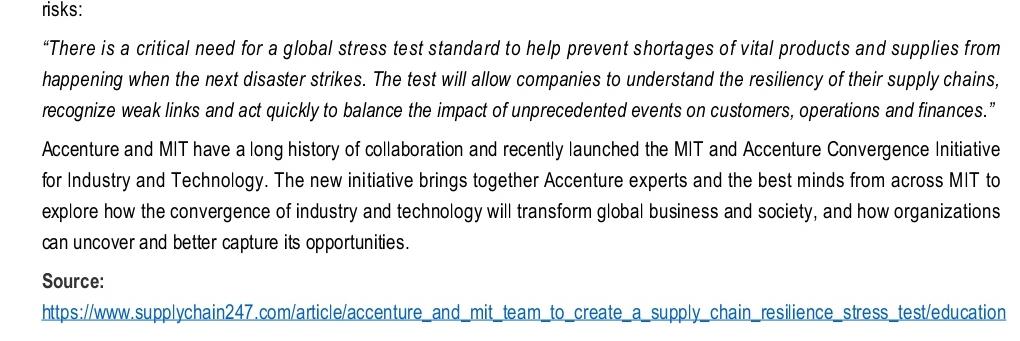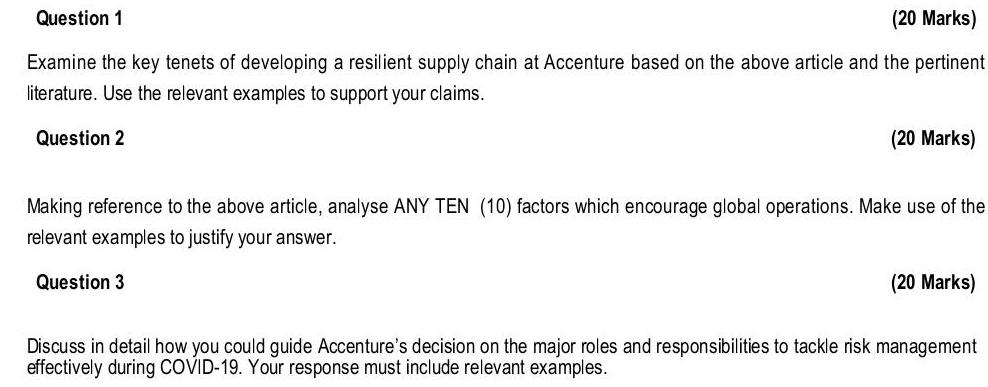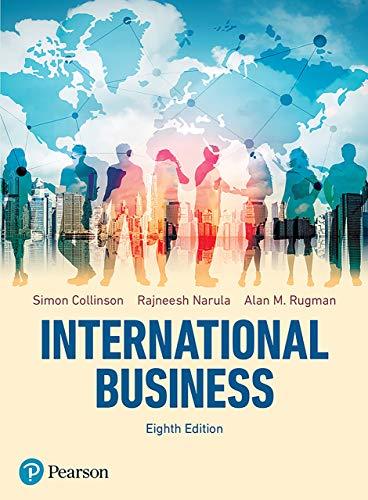Leveraging Accenture's extensive expertise in supply chain, operations and analytics, and MIT's leading research and capabilities in data science, the stress test will quantify





Leveraging Accenture's extensive expertise in supply chain, operations and analytics, and MIT's leading research and capabilities in data science, the stress test will quantify supply chain resilience in a single resilience index. With this test, organizations will be able to quickly identify potential points of failure in their supply chain, assess their related financial exposure, and define appropriate mitigation strategies and actions. Because the scenarios are standardized, organizations both in the public and private sector will also be able to benchmark their resilience against peers and competitors across industries. The test is designed to be scalable and adaptable to changing market conditions and customer expectations as supply chains continue to evolve. Global food company, Sigma, through its European subsidiary Campofrio, is among the companies working with Accenture and MIT to implement the stress test on its supply chain and provide input and use-case insights to its development. Fernando Ibarra, Supply Chain Director of Sigma in Europe: "As a company with a wide international footprint, we need to ensure an uninterrupted supply of products to our customers, no matter what disruptions occur. Managing the impact of COVID-19 required high effort on our side, and in the process, we uncovered several weaknesses in the supply chain we wished we had identified more proactively before. Working with Accenture and MIT on this groundbreaking project will be key to recognize other potential weaknesses and continue increasing our supply chain resilience." The stress test begins with the creation of a "digital twin" of an organization's supply chain. This enables the subsequent modelling of various combinations of scenarios and impact that would significantly disrupt the organization's ability to serve customers, shareholders, employees, and society. Such scenarios could include sudden spikes or drops in demand, the shutdown of a major supplier or facility, scarcity of a critical raw material, or disruption of a key port. The stress test can identify both the time it would take for a particular node in the supply chain to be restored to full functionality after a disruption (i.e., "time to recover") and the maximum duration the supply chain can match supply with demand after a disruption (i.e., "time to survive"). Simchi-Levi, who has published extensively on the need for consistent approaches for identifying and mitigating supply chain risks: "There is a critical need for a global stress test standard to help prevent shortages of vital products and supplies from happening when the next disaster strikes. The test will allow companies to understand the resiliency of their supply chains, recognize weak links and act quickly to balance the impact of unprecedented events on customers, operations and finances." Accenture and MIT have a long history of collaboration and recently launched the MIT and Accenture Convergence Initiative for Industry and Technology. The new initiative brings together Accenture experts and the best minds from across MIT to explore how the convergence of industry and technology will transform global business and society, and how organizations can uncover and better capture its opportunities. Source: https://www.supplychain247.com/article/accenture_and_mit_team_to_create_a_supply chain_resilience_stress_test/education Question 1 (20 Marks) Examine the key tenets of developing a resilient supply chain at Accenture based on the above article and the pertinent. literature. Use the relevant examples to support your claims. Question 2 (20 Marks) Making reference to the above article, analyse ANY TEN (10) factors which encourage global operations. Make use of the relevant examples to justify your answer. Question 3 (20 Marks) Discuss in detail how you could guide Accenture's decision on the major roles and responsibilities to tackle risk management effectively during COVID-19. Your response must include relevant examples. Question 5 (20 Marks) Discuss why Sigma should collaborate with Accenture and Massachusetts Institute of Technology (MIT) to execute the stress test on its supply chain based on article and critically examine the significance for the design of a supply chain resilience.
Step by Step Solution
3.44 Rating (154 Votes )
There are 3 Steps involved in it
Step: 1
Question 1 Developing a Resilient Supply Chain at Accenture Accentures approach to developing a resilient supply chain is outlined in the article and can be inferred from their collaboration with MIT ...
See step-by-step solutions with expert insights and AI powered tools for academic success
Step: 2

Step: 3

Ace Your Homework with AI
Get the answers you need in no time with our AI-driven, step-by-step assistance
Get Started


